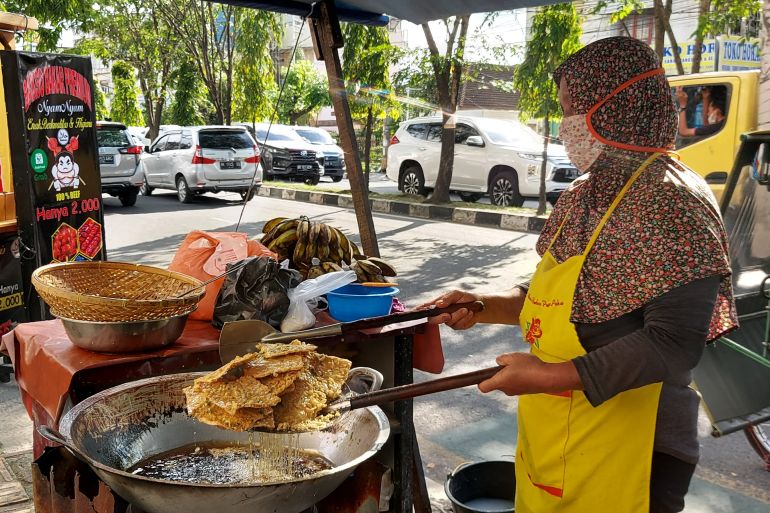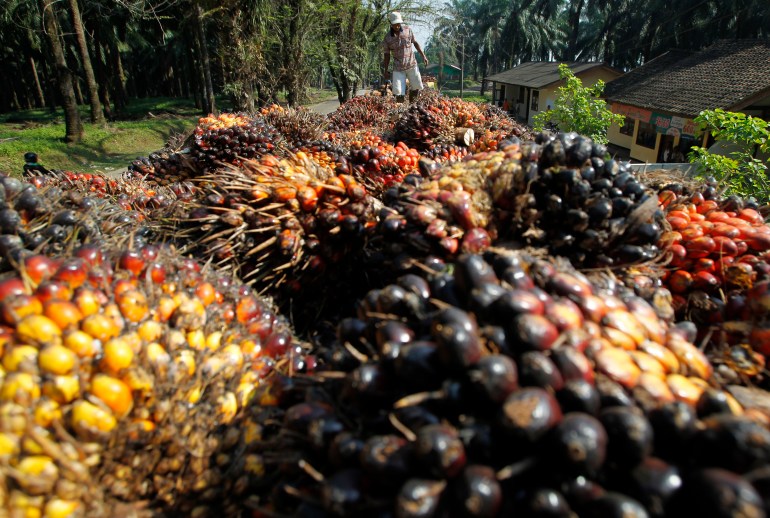Far from Ukraine, Indonesia’s poor can’t get cooking oil
Indonesia is facing shortages as the Ukraine war and other factors send palm oil prices soaring.

Medan, Indonesia – Each day, Siti Rohani fries hundreds of traditional Indonesian snacks at her roadside stall in Medan, North Sumatra, including three kinds of doughnuts, fried tempeh and tofu, banana fritters, spring rolls and curry puffs.
All that frying means Rohani goes through a lot of cooking oil – up to five litres (169 fluid ounces) a day.
Keep reading
list of 4 itemsFrance’s Fearful Campaign
The world needs ‘Peace for Health and Health for Peace’
UN suspends Russia from human rights body over Ukraine abuses
The only problem for Rohani is that cooking oil is becoming increasingly difficult to get hold of amid chronic shortages across the archipelago.
After soaring prices of crude palm oil caused prices of cooking oil to spike more than 50 percent, Indonesia’s government in February capped the price of a litre of oil at 14,000 Indonesian rupees ($0.93). To limit shortages, authorities also began limiting customers to 2 litres (68 fluid ounces) of oil per purchase.
“I had to go all over town from one place to another to buy another litre or two of oil, or to find out that the next place had sold out completely,” Rohani told Al Jazeera. “It just made everything even harder.”
The price cap, which has since been lifted, also had another undesired side effect, according to Posman Sibuea, a lecturer in food technology at Santo Thomas Catholic University in Medan.
“What happened was that cooking oil vendors didn’t want to sell their oil at such a low price, so they started hoarding it,” he told Al Jazeera. “Actually, there are stocks of cooking oil all over the country, but we just don’t know where they are.”
In recent months, the price of crude palm oil used has surged by up to 40 percent, the result of a confluence of factors, including Russia’s invasion of Ukraine, which supplies the majority of Europe’s sunflower oil. With the Ukrainian sunflower oil supply disrupted by the conflict, demand for other oils like palm oil has soared.
The COVID-19 pandemic also affected harvests in palm oil-producing countries such as neighbouring Malaysia, as migrants who usually work on the plantations were locked out of the country.
Indonesia is the world’s largest producer and exporter of palm oil in the world, and production in the country far outweighs domestic demand. Government regulations, however, only require that 20 percent of production stays at home, meaning the rest can be exported abroad.
There is also the issue of who actually owns Indonesia’s oil palms.

“The massive problem with palm oil is that the majority of oil palm plantations in Indonesia are owned by only a few people, maybe 20 at most,” Uli Arta Siagian, a forestry and plantations campaigner at environmental non-profit WALHI, told Al Jazeera.
“These people don’t just own the plantations either, but also the entire industry infrastructure such as the factories and everything else. So they have a monopoly on the industry and a monopoly on the price of palm oil.”
Indonesia produced 44.8 million tonnes of crude palm oil in 2020, according to data from the Indonesian Bureau of Statistics (BPS), 60 percent of which was produced by private companies and 34 percent by individual farmers.
The remaining 6 percent was produced by state-owned companies.
That year, Indonesia exported more than $18bn worth of palm oil, according to BPS data.
“In Indonesia, cooking oil factories don’t usually produce their own palm oil, so they have to buy it from oil palm producers in the form of crude palm oil,” said Sibuea.
“Producers can sell the palm oil at whatever price they want, and as palm oil prices increased globally, it became more difficult for cooking oil factories to buy the raw product. That is one of the key problems, this connection between the palm oil plantations and the cooking oil factories.”
In mid-March, the Indonesian government decided to more than double the maximum export levy on palm oil exports to $375 per tonne as part of a plan to subsidise prices and distribute more than 200 million litres (6763 fluid ounces) of the product across the country each month.
On Tuesday, authorities announced the launch of a cash transfer scheme offering handouts of 300,000 Indonesian rupees ($20) to help lower-income citizens and restauranteurs purchase oil.
Rohani said she had heard about the scheme but was unclear about the details.
“I’d like to apply, of course, if I fulfil the criteria,” she said.

Amid the shortages, some enterprising Indonesians have also taken to buying up as much cooking oil as possible and selling it on the black market at highly inflated prices to desperate customers. In East Kalimantan, a province in Indonesian Borneo, two women died after queueing for hours in the hot sun to get their hands on the meagre supplies of cooking oil available at local mini-markets.
Some Indonesians have questioned why the country is so dependent on cooking oil, including, most prominently, former Indonesian President Megawati Soekarnoputri.
“The problem is not about cooking oil being expensive. I’ve stopped to think, do ladies just fry their food every day? To the point that they’re fighting about cooking oil?” Soekarnoputri said last month during an event about childhood stunting.
“Is there no way to boil or steam or make rujak [Indonesia fruit salad]? Those are Indonesian dishes. Why are people complicating this?”
To prove her point, Seokarnoputri’s party, the Indonesian Democratic Party of Struggle, held a cooking demonstration in Jakarta several days later during which chefs prepared boiled, steamed and grilled dishes while recordings of the former president giving cooking and nutrition advice played in the background.
Siagian, the environmental campaigner, said she agreed that Indonesia has become too reliant on cooking oil.
“If we depend on just one product so much, we are very vulnerable, and handing out cash is not going to solve a complex problem about a sector of the economy that is dominated by private companies,” she said.
“We need an intervention.”